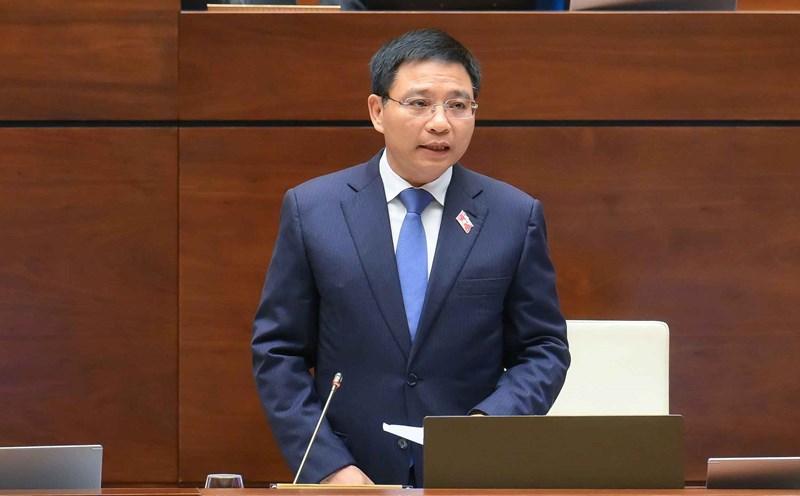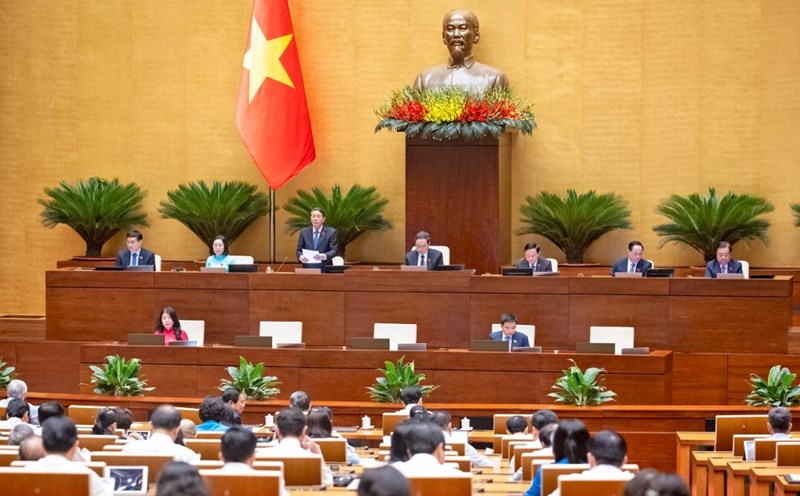14:55: Specific instructions must be given on the elimination of contract tax for business households
Speaking at the end of the questioning in the financial field, Politburo member and National Assembly Chairman Tran Thanh Man said that at the session, 44 National Assembly deputies asked questions, 4 deputies debated; while the delegates registered but have not been questioned due to running out of time, the delegates were requested to send the questions to the National Assembly Standing Committee to send to the Minister of Finance for written answers.
According to the National Assembly Chairman, in recent times, the Finance sector has made many efforts and tries, making an important contribution to stabilizing the macro economy, controlling inflation, increasing budget revenue, and ensuring major balances. State-owned enterprises continue to play an important role in key industries and fields. The private economy has continuously maintained a fairly good growth rate.
FDI enterprises have contributed to promoting innovation, technology transfer, and gradually improving domestic production capacity. Industrial parks and economic zones have initially built a chain of industry and field linkages, contributing to increasing the localization rate and developing large-scale industrial production.
In addition to the achieved results, there are limitations and inadequacies as many delegates have pointed out: low disbursement of public investment capital; growth targets, investment and business activities still face many challenges. The competitiveness of state-owned enterprises is still limited. Most private enterprises have limited scale, competitiveness, and management skills. Simplifying administrative procedures, investment procedures, decentralization and delegation of authority has not met requirements; propaganda on tax and fee policies is still limited. The quality of attracting foreign investment is not high, lacking linkage between FDI enterprises and domestic enterprises. The effectiveness of attracting investment in industrial parks and economic zones has not met expectations.
Request the Minister of Finance, the Government, relevant ministries and branches to accept the opinions of National Assembly deputies, focusing on the following key issues.
First, strengthen financial and budgetary discipline; promote the application of digital transformation, improve the effectiveness and efficiency of state budget revenue and expenditure management. Allocate sufficient state budget resources to speed up the implementation of the Politburo's Resolutions on science, technology, innovation, law-making, reforming the apparatus, exempting and reducing tuition fees... according to the roadmap.
Speed up the disbursement of public investment capital; decentralize, delegate authority, reform, cut and simplify administrative procedures related to investment activities, production and business.
Second, perfect the mechanism for monitoring and evaluating corporate governance efficiency. Restructure finance, capital, assets, streamline the organization and personnel to optimize costs and improve labor productivity. Focus on investing in key, sustainable industries and fields.
Third, effectively implement Resolution 68 of the Politburo on private economy and Resolution No. 198 of the National Assembly on a number of special mechanisms and policies for private economic development. Research and propose amendments to the Law on Supporting Small and Medium Enterprises.
Review and improve the legal framework on individual business, encourage business households to convert to enterprises; communicate and provide specific guidance on eliminating contract tax for business households.
Fourth, proactively grasp and promptly handle problems, quickly resolve investment procedures, speed up the progress of large FDI projects; prioritize high-tech enterprises with high added value, plans for technology transfer and linking with domestic enterprises. Resolutely handle FDI projects that cause environmental pollution, ineffective land use, and do not fulfill investment commitments.
Fifth, perfect regulations on industrial parks and economic zones. Develop ecological industrial parks and coastal economic zones. Promote decentralization and delegation of authority to improve the effectiveness of state management of industrial parks and economic zones.
14:33: According to Deputy Prime Minister Ho Duc Phoc, the estimated disbursement of public investment capital since the beginning of the year has reached 22.2%, which affects slow growth and issues such as labor settlement and other related issues.
The Deputy Prime Minister acknowledged that the first reason is also the most fundamental, which is the problem of slow investment preparation. The capital allocation of authorities at all levels and investors leads to slow investment.
In addition, compensation and site clearance are not one step ahead; The project is slow to approve, and bidding takes a long time.
"The issues related to causes have been amended by the National Assembly in the State Budget Law as well as the Law on Bidding, Public Administration... In the near future, these issues will also be fully resolved. We will direct the People's Committees of provinces, ministries, branches, and investors to pay attention and promote public investment to become a driving force, leading investment sources in the whole society" - said the Deputy Prime Minister.
Regarding the issue of tax collection for business households, the Deputy Prime Minister acknowledged that the removal of contract tax is very correct, as generally reflected in Resolution 68. However, he said that the Ministry of Finance needs to study and advise competent authorities to regulate this contract tax at a certain revenue level, creating favorable conditions for poor households and small-scale businesses, ensuring the issue of people's livelihood.
"As for the revenue of small business households, with a revenue of less than 1 billion VND, they should be contracted because if invoices are issued, business households will be at a disadvantage because there are no input invoices. No input invoices will not be refunded.
In essence, household tax has 3 types of tax: Card taxes - they still pay normally; VAT; personal income tax. Therefore, applying tax policies to households with small incomes will ensure convenience for tax authorities and business households, and not lose state budget revenue. Those with large revenues, over 1 billion VND, have stable business locations, collect according to invoices - both transparent and anti-income, creating conditions for these business households to grow into enterprises the Deputy Prime Minister suggested.
11:25: Many outstanding entrepreneurs have been trusted to hold important positions in the political system
Delegate Ha Sy Dong (Quang Tri Delegation) was interested in prioritizing entrepreneurs to participate in national governance. The Minister is requested to inform us of the practical basis and specific tasks so that the business community can participate in national governance in a practical way.
Responding to this issue, Minister Nguyen Van Thang said that in the period of innovation and integration, the business community has affirmed its position in many fields and made significant contributions to many issues of the country. Not only leading the development of businesses, entrepreneurs play an important role in economic development strategies, attracting investment, and ensuring social security.
The Minister said that in recent times, many outstanding entrepreneurs have been trusted and introduced to participate in many important positions in the political system and elected bodies.
The Government, ministries and branches also make the most of the gray matter of entrepreneurs participating in major projects and issues that the Party, State and people are interested in. However, business people's participation in the political system is still limited. Therefore, Resolution 68 of the Politburo recently has a policy to mobilize outstanding, dedicated, and capable businessmen to participate in national governance.
Regarding solutions, the Minister said that the first is to create a favorable legal mechanism, complete the legal framework, encourage entrepreneurs to participate in consulting positions, state management or run for election to elected bodies such as the National Assembly and People's Councils at all levels.
Second, create maximum conditions for regular exchanges and dialogues between the State and enterprises, especially in criticizing, developing and implementing policies. This is an issue that has been discussed in the past, but it needs to be discussed more closely and widely.
Third, businessmen themselves need to comply with business ethics, uphold the law and improve qualifications and prestige to participate in positions in the political system, along with the state to create development.
14:20: Proposal to establish a trading floor for literary and artistic works at the International Financial Center
Regarding the National Assembly delegate's question about the operation of specialized exchanges for literary and artistic works when establishing the International Financial Center in Ho Chi Minh City and Da Nang, Minister Nguyen Van Thang assessed that the market for cultural and artistic works in our country is currently still small, lacking professional trading platforms while the demand for creativity, ownership and collection is very large.
"This is not only cultural potential but also economic potential if organized and managed properly," said Minister Nguyen Van Thang.
According to the Minister, in the process of developing a resolution on the International Financial Center, the Government has proposed to consider establishing a specialized trading floor, including a floor for literary works, fine arts, digital literature, performing arts, etc.
In addition, there will be a digital artwork exchange associated with blockchain technology. This is accompanied by a mechanism for valuation, ownership authentication, and transparent payment.
The Minister of Finance said that the Ministry will continue to advise the Government to set up other floors at the International Financial Center.
At the same time, Minister Nguyen Van Thang also said that the Government has recognized the risks of establishing trading floors. The above trading platforms also have some potential risks that can be taken advantage of to legalize illegal cash flow through product trading, speculation risks, real estate "inflation"...
The Government will continue to research to develop a guiding decree to create a specialized legal framework for work registration, work transactions, and a reasonable market price determination mechanism to avoid "price inflation", market manipulation, etc.
In addition, applying technology to increase transparency, authenticate work ownership rights... At the same time, there is an inter-sectoral monitoring mechanism of relevant agencies to ensure the market operates transparently.
14:15: Labor training must be included as a condition when attracting FDI
Delegate Nguyen Cong Long (Dong Nai Delegation) said that regarding FDI investment attraction, voters are concerned about the rights of workers in FDI enterprises.
The current situation is that FDI enterprises do not train and make full use of domestic resources, pushing the burden of human resource training for the State and localities.
In the use of labor, this enterprise uses the trick of probationary contracts and then firing, especially older workers. In the FDI attraction policy, how will we resolve this conflict to both attract and ensure social security?

Responding to the opinion of delegate Nguyen Cong Long, the Minister said that FDI has made great contributions to economic growth, import-export, budget collection and job creation. However, in FDI, there are also enterprises that have problems in labor use.
According to statistics, the FDI sector is currently attracting 5.1 million workers, accounting for nearly 10% of the total labor force of the country; accounting for 20% of the total labor force working for wages and indirectly creating jobs for many millions of other workers.
According to statistics, 57% of FDI enterprises implement training programs for employees. Thus, only 43% of enterprises do not have these programs.
The average salary of workers in the FDI sector is higher than that of the state and non-state sectors.
Regarding solutions, the Ministry of Finance proposes to continue perfecting the policy system, in which the issue of labor training must be included as a condition when attracting FDI.
Develop orientation and policies in selecting investment partners, prioritizing industries and high-tech products, creating great value, better protecting vulnerable labor groups in the market. Develop a labor support policy and clearly define strategic orientations, prioritizing the development of occupations.
14:05: The real estate and gold markets are interconnected, reflecting the health of the economy. Delegate Le Thi Thanh Lam (Hau Giang Delegation) said that according to the report on the financial, monetary and real estate markets, there are many difficulties, gold is unstable, challenges for GDP growth of 8% or more this year, with the role of State management of the economy, what advice does the Minister give the Government to overcome the above challenge?

Responding to questions, Minister Nguyen Van Thang affirmed that the financial - monetary, real estate and gold markets are interconnected, closely linked to the national economy and are considered a "circulating blood vessel", creating dynamism and reflecting the health of the economy.
However, the Minister also pointed out that these markets always have many potential risk factors and are sensitive to fluctuations in the world and domestic situations. Therefore, he emphasized the need to have "essential, long-term and synchronous" solutions to develop these markets safely, healthily and sustainably, while being strictly controlled and promptly regulated when necessary.
Regarding specific solutions in the coming time, Minister Nguyen Van Thang said that the Ministry of Finance will continue to closely coordinate with the State Bank, the Ministry of Construction and relevant ministries and branches to implement a number of key tasks.
First, perfect the legal framework to develop market factors, trading floors in a synchronous, modern, stable and transparent manner. Strengthen the mechanism for monitoring, inspection, supervision and timely forecasting and warning of risk factors.
Second, continue to research and perfect tax mechanisms and policies for these markets to reasonably regulate and orient the market.
Third, focus on removing difficulties and obstacles, especially in legal aspects to unlock resources from these markets, focusing on economic growth and development.
Fourth, continue to promote the improvement of the investment and business environment, facilitate investment for businesses, develop production and business to improve the efficiency of capital absorption of the economy.
The Minister affirmed that these solutions aim at the common goal of maintaining macroeconomic stability, controlling inflation, ensuring major balances of the economy, promoting growth, so that markets can contribute more effectively to the development of the country.
On the afternoon of June 19, Politburo member and National Assembly Chairman Tran Thanh Man continued to chair the first group of questions in the financial sector with the main answer being Minister of Finance Nguyen Van Thang.
This group of issues focuses on the contents of solutions on financial work for socio-economic development, ensuring growth targets, renewing traditional growth drivers, establishing and promoting new growth drivers.
Solutions to improve the operational efficiency of state-owned enterprises; solutions to support and promote the development of the private economy to become the most important driving force of the economy; solutions to promote the attraction of foreign direct investment (FDI). Mechanisms and policies to promote, attract investment and develop industrial parks and economic zones.
Also attending were Deputy Prime Minister Ho Duc Phoc, Deputy Prime Minister Nguyen Chi Dung, Ministers of the Ministries of Industry and Trade, Agriculture and Environment, Construction, Science and Technology, and Foreign Affairs.
The question-and-answer session with Minister of Finance Nguyen Van Thang is expected to last until 2:50 p.m. on the same day.
One of the contents that many delegates are interested in is the regulation requiring the application of electronic invoices from cash registers. Many business households and individuals are confused about electronic invoices, which solutions specifically guide the implementation of tax invoices well.
Delegate Tran Thi Kim Nhung (Quang Ninh Delegation) suggested that the Minister inform the Minister about what solutions for his industry as well as advise the Government to ensure a balance between the mechanism of opening the air for businesses such as opening all mechanisms on land, taxes, capital, appointing bids, not appraisal...
The solution to balance that open mechanism with the mechanism to control control control, prevent the emergence and relationship of backyard enterprises that the Minister of Public Security paid great attention to at the question-and-answer session of the 6th session of the 15th National Assembly.
The Minister would like to inform us about the difficulties in implementing the connection between tax authorities and business registration agencies in the process of implementing business identification according to Decree 69 of the Government and what solutions are needed to overcome them?











